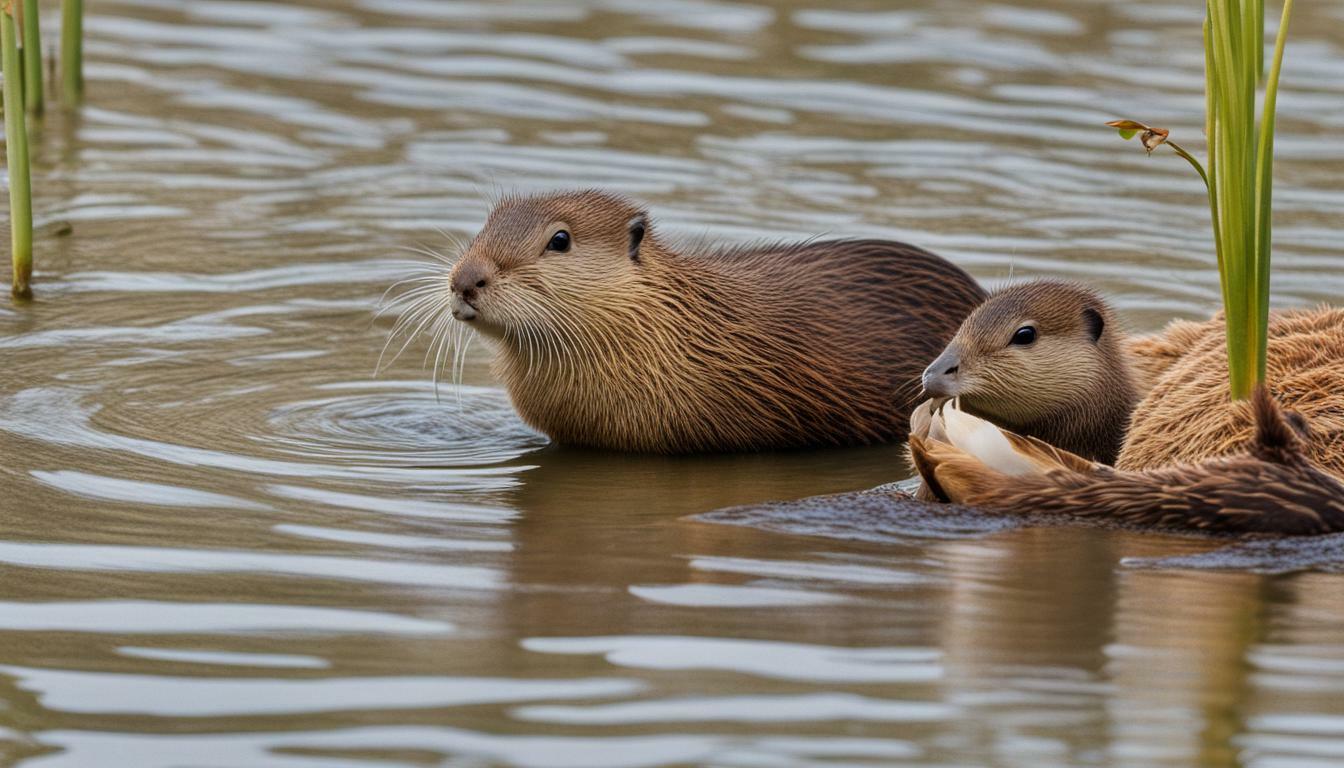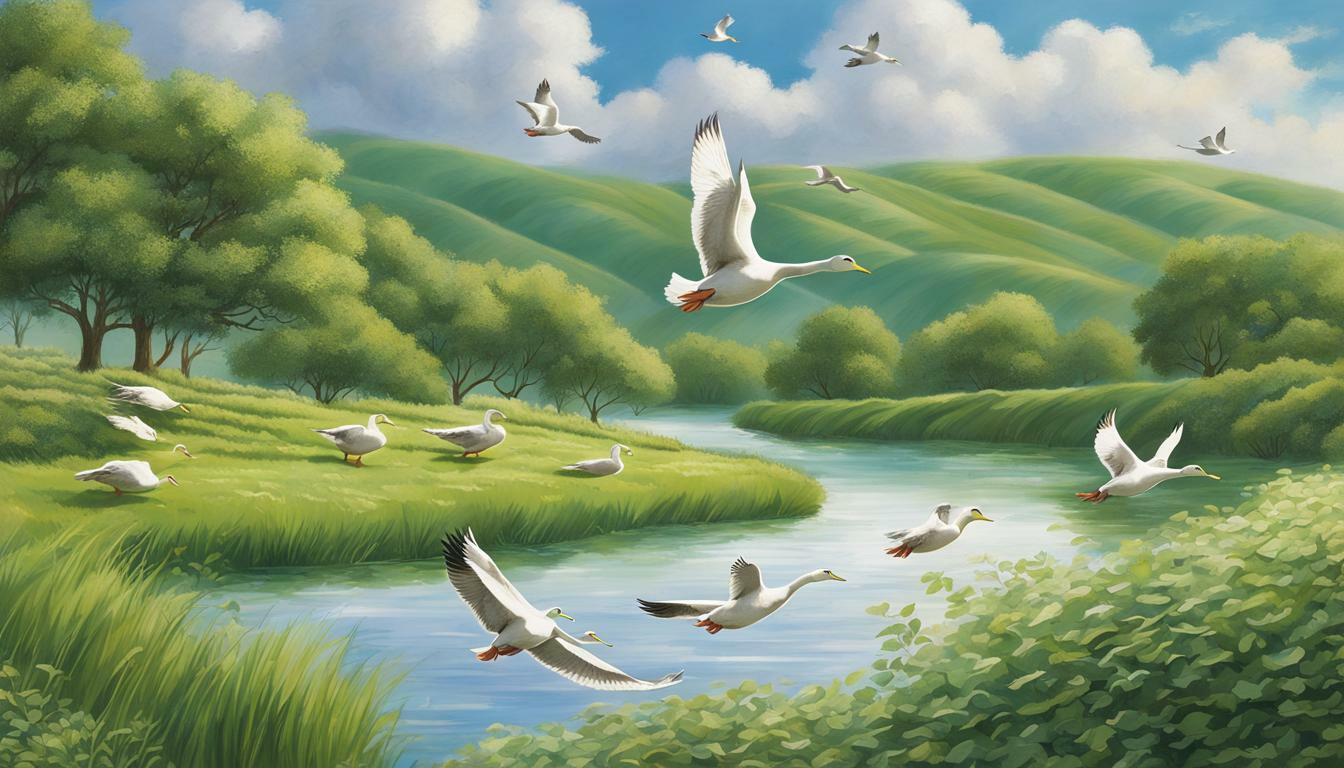Do Muskrats Eat Ducks? Uncovering Wildlife Myths

Table of content:
Muskrats and ducks often share the same wetland habitats. This can lead to predation, as muskrats are omnivorous rodents that will eat small birds like ducklings. Muskrat attacks on adult ducks are rarer, but do occur. If you keep domestic ducks, you may be wondering how much of a threat muskrats pose.
Do Muskrats Attack Ducks?
Muskrats are not specific duck predators. They are opportunistic feeders that consume a wide variety of vegetation and animal matter. However, muskrats have been observed attacking and eating ducks in some circumstances.
Most documented cases involve muskrats preying on ducklings and younger juvenile ducks. There are fewer instances of muskrats attacking adult ducks, likely because adults are larger and more able to defend themselves.
A research study conducted in Canada found that over a third of muskrat stomach contents contained duck remains. Almost all of these remains were from ducklings rather than adults. The youngest ducklings are most vulnerable. One-day old ducklings were the most common age group eaten by muskrats in this study.
So while muskrats are not specialized to hunt ducks like other predators, they do take advantage of easy duckling meals when given the chance. Many other animals also opportunistically prey on young ducks, including foxes, snakes, large birds, turtles, and other rodents like mink.
What Do Muskrats Eat Besides Ducks?
Muskrats are omnivores who eat a wide variety of plant and animal matter. When animal matter makes up a larger portion of their diet, they are sometimes described as opportunistic carnivores.
The vegetable portion of a muskrat’s diet usually consists of roots, shoots, leaves, and aquatic vegetation like cattails and water lilies. They prefer wetland plants but will also forage for grasses, corn, wheat, and other agricultural crops.
Muskrats supplement this plant diet by hunting for fish, snails, crayfish, insects, amphibians like frogs, and small mammals including young rabbits. Bird eggs and nestlings may also be eaten. Ducks make up a very small percentage of overall muskrat diet.
The availability of food sources causes shifts in dietary composition by season and location. During colder months for example, muskrats eat more animal matter compared to warmer seasons when vegetation is abundant.
How Do Muskrats Catch Ducks?
Muskrats use several techniques to prey on ducks, especially younger ones:
- Stealth ambush – Muskrats will hide in vegetation at the water’s edge and wait motionless for ducks to come near. They then lunge out suddenly to grab unwary ducks.
- Burrow ambush – Some muskrats excavate burrows in earthen banks overhanging the water. They hide inside and snatch ducklings that swim or feed too close.
- Open water chasing – Muskrats are agile swimmers and can rapidly chase down swimming ducklings. Attacks usually occur from below or behind.
- Nest raids – Muskrats are adept climbers and will raid nests of ground-nesting ducks to eat eggs and grab hatchlings.
Muskrats are most dangerous to ducks during spring and early summer when new ducklings are abundant. They may also be more likely to attack during lean times when other food becomes scarce.
Adult ducks typically manage to escape muskrat ambushes through swimming speed and their ability to fly away. Younger flightless ducklings are much more vulnerable as they cannot easily evade muskrats in the water or on land.
Why Do Muskrats Go After Ducks?
Muskrats do not hunt ducks specifically, but they have clear reasons for opportunistically attacking them:
Easy prey – Ducklings and fledgling ducks present easy catching and eating opportunities for muskrats. They pose minimal risk compared to other warm-blooded prey.
High calorie – Ducks provide a good meal. Ducklings offer lots of calories in a small package, with more fat and protein than plant foods.
Varied diet – As omnivores, muskrats likely get nutritional benefits from adding duck to an otherwise vegetation-heavy diet.
Foraging competition – Muskrats may view ducks as competitors consuming resources like aquatic plants. Eating ducks reduces this competition.
Territorialism – Muskrats are territorial, especially males in the breeding season. Killing ducks may be an attempt to remove them from defended territories.
Surplus killing – Muskrats sometimes kill more ducks than they can immediately eat. This surplus killing behavior is puzzling but observed in many predators.
In summary, easy availability, nutritional benefits, competition and territorial aggression all motivate muskrats to opportunistically prey on ducks despite this not being a primary food source.
Can Muskrats Kill Adult Ducks?
Most reported cases of muskrats attacking ducks involve ducklings or young birds. Healthy adult ducks are harder prey. Their larger size requires more effort and risk for a muskrat to kill.
However, there are some documented instances of muskrats killing adult ducks:
- Mauled by multiple muskrats – On rare occasions, a gang of 2-3 muskrats will jointly attack to overwhelm a single adult duck.
- Underwater ambush – Some evidence indicates muskrats may “pull down” swimming ducks by stealthily approaching from below and yanking them underwater to drown.
- Trapped on land – Ducks grounded on land due to injury or molting may be vulnerable to extended muskrat attack.
- Confined spaces – Muskrats and ducks housed together in cages or artificial ponds increases chances for fatal attacks on adults.
While rare in the wild, these cases confirm adult ducks are not invulnerable to muskrat aggression under certain circumstances. Lone ducks ambushed by multiple muskrats or trapped on land face the most danger.
Do Muskrats Only Eat Baby Ducks?
As covered earlier, muskrats do preferentially prey on younger ducks like ducklings over adults. However, they do not exclusively eat babies.
Muskrats will consume any age duck they can overpower and kill. Most evidence suggests:
- Ducklings – Newly hatched ducklings are the most frequent duck prey for muskrats. Their tiny size makes them highly vulnerable.
- Fledglings – Juvenile ducks that have left the nest are still not adept fliers, making them easier targets.
- Molting adults – Adult ducks losing flight feathers during molting season cannot escape muskrats as easily.
- Injured/sick adults – Compromised adult ducks may fall prey more often than healthy ones.
So while tiny ducklings are certainly the easiest and most appealing duck prey for muskrats, adults can still potentially be attacked and eaten in the right circumstances.
How Can I Protect My Ducks From Muskrats? Tips and Solutions
If you keep domestic ducks as pets or livestock, how can you safeguard them from potential muskrat predation? Consider these muskrat deterrence and control measures:
- Remove vegetation – Cut back aquatic plants and brush that give muskrats cover for ambushes. Create clear sight lines.
- Use fencing – Install mesh fencing around duck pens and runs to form a physical barrier. Bury bottom 1-2 feet underground to prevent burrowing under.
- Limit water access – If feasible, restrict duck access to ponds, marshes and slow streams used by muskrats during prime spring duckling season.
- Scare tactics – Motion-activated lights, sounds or sprinklers may startle muskrats away from duck pens at key times like night.
- Repellents – Muskrat repellents containing castor oil, garlic or capsaicin may provide temporary deterrence. Reapply frequently.
- Trap and relocate – In some states, live-trapping and relocating problem muskrats is an option. Check local regulations first.
Preventing muskrat predation ultimately requires removing opportunities for ambush by improving visibility, restricting shared water access, and physical barriers like fencing. Lethal removal of specific problem muskrats is a last resort if other deterrents fail.
Final Thoughts
While not specifically adapted to hunting ducks, opportunistic muskrats will readily prey on easy targets like ducklings while also occasionally attacking adult ducks. This creates a potential threat for domestic ducks that needs to be managed through practical solutions aimed at excluding muskrats and minimizing interactions. With some vigilance and deterrent measures, you can continue to enjoy keeping ducks even in muskrat-inhabited areas.
Welcome. I’m Adreena Shanum, the proud owner of this website, and I am incredibly passionate about animals, especially poultry. I founded adreenapets.com as a labor of love, stemming from my desire to share my knowledge and experiences with poultry enthusiasts worldwide.




